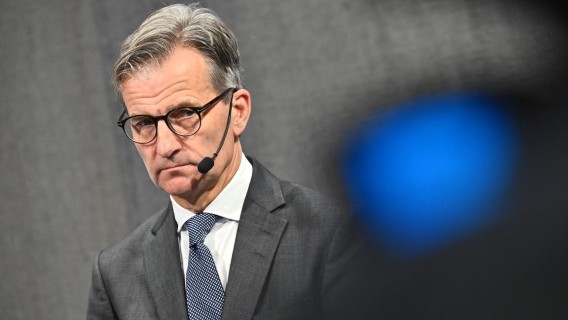Resume af teksten:
Sveriges Riksbank forventes ikke at reducere renten den 20. august, da inflationen ligger højere end forventet, og den økonomiske genopretning hæmmer. Markederne vurderer en 20% sandsynlighed for en rentesænkning, men centralbanken har antydet mulighed for yderligere tiltag i 2025. Inflationens stigning, især CPIF på 3%, overskrider Riksbankens 2,5% mål og kan kræve stramninger. Sveriges økonomi, afhængig af eksport, har set langsom bedring på grund af globale handelskonflikter, hvilket har ført til en nedjusteret 2025 BNP-prognose. Trods arbejdsmarkedsusikkerhed er forbrugertilliden på vej op, og større EU-forsvarsudgifter kan gavne landet. På valutamarkedet forventes en moderat positiv reaktion for den svenske krone, med fokus på SEK’s overordnede styrke mod euroen.
Fra ING:
Sweden’s Riksbank is unlikely to cut in August as inflation overshoots and recovery stalls, despite lingering market hopes

Sweden’s Riksbank Governor Erik Thedeen
Sweden’s Riksbank meets on 20 August. And while a rate cut at this meeting is unlikely – markets are pricing a 20% probability – there’s the lingering question of whether the central bank needs to ease policy again later this year. The Riksbank’s June statement cryptically suggested that there is “some probability” of another cut in 2025.
We are less sure – our view is that the Riksbank’s easing cycle is over.
Partly that’s because inflation has been coming in well above the Riksbank’s expectations. July’s CPIF hit 3%, well above the central bank’s 2.5% projection. That’s tracking a lot closer to the central bank’s “high inflation” scenario, which the latest set of forecasts indicated could conceivably even require policy tightening by early next year.
That would be an extreme interpretation of the recent data. Much of the spike is likely to be temporary, though not all of it. Just as we’ve seen in other parts of Europe, food prices are beginning to add more pressure.
That’s the main thing preventing the Riksbank from easing further at this point, though it’s worth saying that Sweden’s recovery has disappointed this year. The rapid string of rate cuts last year was supposed to promote a cyclical upswing, more so than in other developed economies, due to Sweden’s greater prevalence of variable-rate lending.
Being a nation highly dependent on trade (exports make up 55% of GDP), the tariff war and the uncertainty associated with it have delayed the recovery. That led the Riksbank to revise down its 2025 GDP forecast from 1.9% to 1.2%.
The jobs market also remains in a precarious position. The unemployment rate has fallen to 8.3% from 9% in May, though the data is highly volatile. That’s still above pre-Covid levels, and vacancies are at their lowest since November 2020.
Growing confidence despite labour market weakness

Source: Macrobond, ING
The good news, at least, is that consumer confidence has begun to recover, having dipped through the spring. Household spending rose in June after a weak May. Remember too that Sweden is disproportionately likely to benefit from greater EU defence spending over the next couple of years, given it hosts some of the largest equipment manufacturers.
In short, it’s a mixed economic picture, but one which doesn’t scream a need for additional monetary support just yet. Remember too that at 2%, Swedish rates are the same as the eurozone. A September cut narrowly remains our base case for the ECB, but unless we see more material divergence, there’s little need for the Riksbank to react in kind.
FX: We are still constructive on SEK
We think Riksbank could sound a bit more hawkish than market expectations at this August meeting, and therefore expect a moderately positive SEK reaction.
We have recently revised our EUR/SEK forecast modestly higher but we retain a bearish view on the pair on the back of our more hawkish view on Riksbank relative to pricing and fundamental overvaluation. We target 11.00 by year-end.
Any advancements towards a ceasefire in Ukraine should also help SEK. While that would be more evident in other crosses (e.g. lower USD/SEK), we think EUR/SEK should still be trading lower too in a broad geopolitical de-escalation due to the krona’s usually higher beta.
Hurtige nyheder er stadig i beta-fasen, og fejl kan derfor forekomme.










